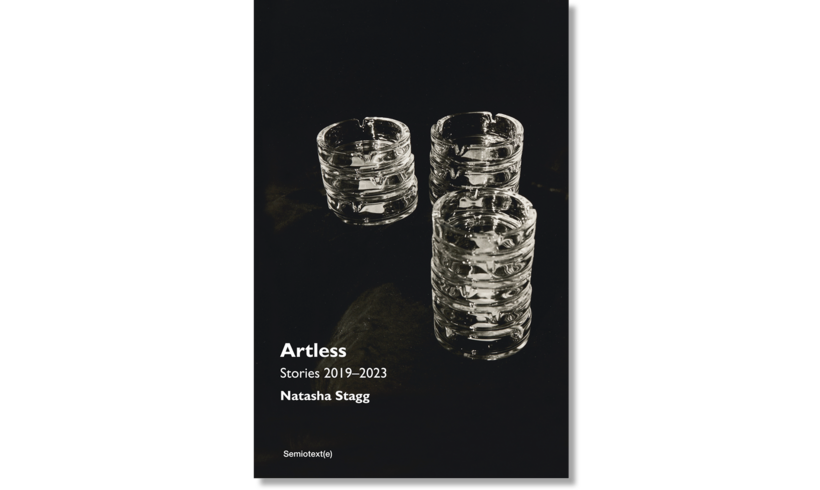Book Review: Natasha Stagg’s: Artless
by Grace Grocholski

Spanning work from 2019-2023, Natasha Stagg’s critical essays and fiction are collected in her latest book, Artless. In language that is simultaneously cool, detached, and direct, Stagg offers observations on subjects including art, fashion, and culture (both online and of). As in her previous collection, Sleeveless, she traverses the ground between observer and consumer, making the challenge of delineation look effortless, even blasé. Her style is never overworked—both personal and cultural observations appear in loose association, often giving essays an unfinished feel. Stagg’s fictional pieces focus on scenes between family members or friends, showcasing a different style altogether.
With insider knowledge of New York fashion, art, and commerce, Stagg explores the tension between art and advertising. Stagg makes a living primarily working for brands writing ad copy, and this complicity adds a layer of complexity to her work. In her introduction, she describes working on set as the questioner at a behind-the-scenes interview, which was intended to be repurposed in advertising. It does not go as planned. Stagg reflects on the failure, saying “The time it took to achieve nothing had cost a relative fortune.” But the observation brings to mind the hypothetical: if the interview had gone well, would that have been “something”? In a later piece, Stagg clarifies her belief: “Advertising is not nothing, it’s one of the most substantive acts we have.” Yet capital’s meaning and impact change overtime, as she is aware, “changing shape and shaping us, like a more physical kind of weather.” This “weather” is an ambient presence in her work.
A few pieces on celebrity open the collection, tangible subjects that give Stagg an accessible framework. A more free-form personal essay, “The Dollhouse”, reflects on the #MeToo movement and power imbalances within relationships. Conversations feel lifted from life, and Stagg details a romance with an actor whom she had a crush on as a teen. This personal approach is used to great effect and makes these personal essays some of the most engaging in the collection.
Returning to branding and identity, Stagg explores the current culture of self-commodification. Does acknowledging her understanding of the underpinnings of social media make her exempt? In detaching herself from platforms like Twitter and Instagram, does she gain a perspective that is less corrupted by influence? Her unmediated experience is still tethered to a culture in which self-promotion becomes a rubric for celebrity. It’s the topic of “Social Suicide”, an essay about leaving social media and its reverberations in her personal and professional life. The piece echoes themes found in her novel Surveys, whose protagonist goes from obscurity to celebrity through social media, and the consequences of self-commodification. Ultimately, for Stagg, abstaining from social media is just “cool”. Being unknowable becomes desirable.
Desire is intrinsic to Stagg’s experience of fashion as well. Consumer culture is the topic of “Trends, 2021”, in which Stagg observes a young woman dressed in a way she considers tacky, unsophisticated. Later she sees the same style on someone else. “Either she had pulled off the look better or I had become obsessed with my own initial reaction, transforming disgust into desire”. Stagg explains the shift in perspective: “This is the meaning of fashion, to me.”
In the few fictional pieces that dot the collection, including “Rock, Paper, Scissors”, “Transplant”, and “Nowhere to Sit”. Stagg explores characters in relation to one another, often feeling alienated or adrift. The pandemic adds a particular feel to these pieces as well, rooting them in time and an air of quiet uncertainty. Having these pieces mixed in with the critical essays without delineation could cause confusion, but it is a choice that showcases Stagg’s versatility as a writer. In her previous collection of essays, fiction was interwoven to similar effect, not adding to the critical material, but giving voice to similar themes and showcasing a different style.
Stagg’s versatility as a writer is a unique strength that makes her work compelling, in addition to her attention to diverse cultural themes. In critical essays that blend the personal with the global, Stagg’s eye is aloof yet unsparing. No one is above judgment, and yet she herself is complicit, as she acknowledges. Her self-awareness gives her an unflinching perspective on topics like art and fashion, nebulous concepts she concretizes. Fiction allows her an escape from her own experience into the minds and lives of others, exploring themes through dialogue and situational interaction. Stagg’s guardedness gives her writing a considered and intentional quality, making Artless, though fragmented and at times understated, a curated work of art.
Grace Grocholski is a part-time librarian, full-time bookworm. In her spare time, she enjoys running, baking, and feeding her online chess addiction.



